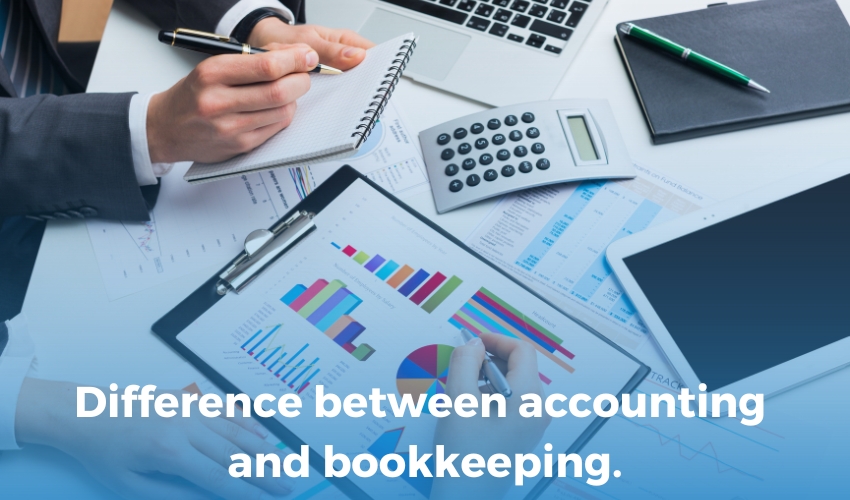

19-09-23
In the world of finance, the terms "accounting" and "bookkeeping" are frequently used interchangeably, creating confusion regarding their precise functions and distinctions. Despite both being integral to managing a company's financial records, they serve separate purposes and entail different levels of complexity. Understanding the difference between accounting and bookkeeping or difference between bookkeeping and accounting is crucial for efficient financial management. In the United States, grasping the disparities between accounting vs. bookkeeping is imperative. In this article, we will delve into the nuances that differentiate these two disciplines.
1. Core Responsibilities
Bookkeeping: Fundamentally, bookkeeping entails the orderly recording of financial transactions. Bookkeepers focus on the day-to-day tasks of documenting financial data such as sales, purchases, payments, and receipts. Their primary objective is to ensure the precise recording, categorization, and filing of each transaction.
Accounting: In contrast, accounting encompasses a broader spectrum of financial activities. Accountants utilize the data documented by bookkeepers to generate financial statements, analyze trends, and make financial decisions. They interpret financial information, conduct audits, and provide strategic financial advice to businesses.
2. Scope of Work
Bookkeeping: Bookkeepers mainly deal with the foundational aspects of financial transactions. Their duties include maintaining ledgers, reconciling accounts, tracking expenses, and preparing invoices. Their focus is on the accurate recording and organization of financial data.
Accounting: Accountants operate at a more comprehensive level. They utilize the data compiled by bookkeepers to create financial statements such as balance sheets, income statements, and cash flow statements. Accountants analyze these statements to assess a company's financial health, performance, and tax obligations.
3. Education and Certification
Bookkeeping: While formal education is not always mandatory for bookkeeping, many bookkeepers opt to pursue an associate degree or a certificate program in bookkeeping. Certification, such as becoming a Certified Bookkeeper (CB), can enhance career prospects.
Accounting: To become an accountant in the United States, one typically requires a bachelor's degree in accounting or a related field. Moreover, achieving the status of a Certified Public Accountant (CPA) involves passing the CPA exam, which demands a higher level of education and experience.
4. Analysis and Decision-Making
Bookkeeping: Bookkeepers primarily concentrate on the accurate recording of financial data. They typically do not engage in in-depth financial analysis or strategic decision-making. Their role is to provide organized, detailed records for accountants to utilize in their analyses.
Accounting: Accountants play a pivotal role in financial analysis and decision-making. They employ financial data to evaluate a company's profitability, assess its financial stability, and propose strategies for improvement. Accountants are also instrumental in tax planning and compliance.
5. Legal and Regulatory Compliance
Bookkeeping: Bookkeepers ensure that financial records adhere to generally accepted accounting principles (GAAP) and pertinent tax regulations. They lay the foundation for accurate financial reporting and compliance.
Accounting: Accountants possess a deeper understanding of intricate financial regulations and tax laws. They assist businesses in navigating these regulations, preparing tax returns, and ensuring adherence to all legal requirements.
6. Time Horizon
Bookkeeping: Bookkeeping primarily concerns day-to-day and month-to-month financial activities. It primarily focuses on short-term financial tracking and record-keeping.
Accounting: Accounting adopts a longer-term perspective, frequently analyzing financial data over quarters, years, or multiple financial periods. It assists businesses in planning for the future and making strategic financial decisions.
7. Software and Technology
Bookkeeping: Bookkeepers frequently employ accounting software and tools to streamline data entry and record-keeping processes. Popular software options include QuickBooks, Xero, and FreshBooks.
Accounting: Accountants also harness accounting software, but their role extends beyond data entry. They use software to generate financial reports, analyze data, and provide strategic recommendations.
8. Cost Differential
Bookkeeping: Bookkeeping services are generally more cost-effective than accounting services. As bookkeepers handle routine tasks, their hourly rates are typically lower.
Accounting: Accounting services are more comprehensive and often entail higher-level analysis. Consequently, accountants typically charge higher hourly rates for their expertise.
Conclusion
In summary, though both accounting and bookkeeping are vital components of financial management, they serve separate purposes and involve different levels of responsibility and expertise. Bookkeepers focus on the meticulous recording and organization of financial data, while accountants employ this data to analyze financial performance, ensure compliance, and offer strategic financial guidance.
Understanding these differences is imperative for businesses in the United States. By recognizing the distinct roles of bookkeepers and accountants, companies can make informed decisions regarding their financial management requirements, ensuring the accurate maintenance of financial records and adherence to regulations. Ultimately, both bookkeeping and accounting are indispensable pieces of the financial puzzle that contribute to a company's prosperity and financial well-being.
Read more: What's Included in Professional Bookkeeping Services? Let’s Explore
Tags :













































.jpg)
.jpg)
.jpg)
.jpg)


).jpg)














 Get A Quote
Get A Quote
Leave A Comment